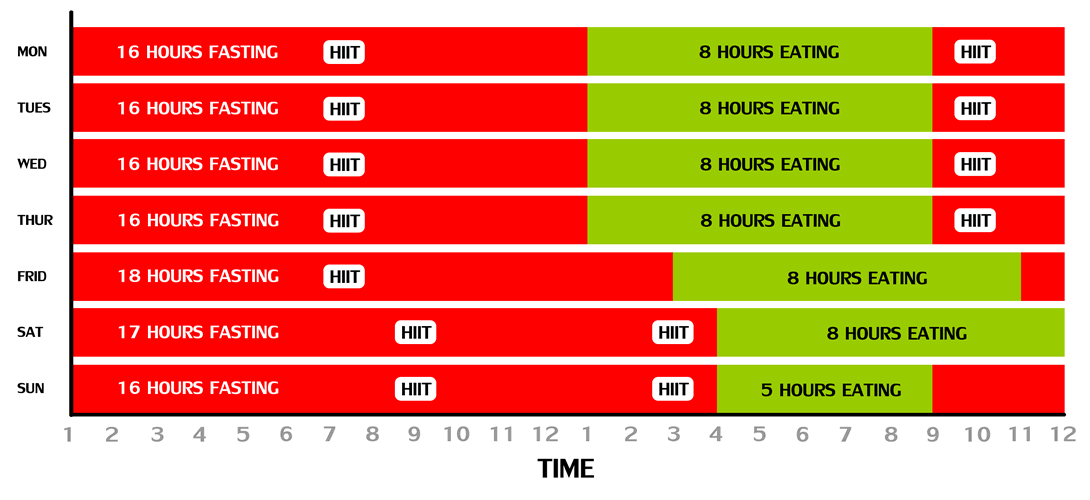Intermittent fasting (IF)
Intermittent fasting (IF) is not a diet. You do not control calories or have any major restrictions on what you eat. You not will be starving yourself because your body has a lot of fat reserves to consume. Intermittent fasting means having a fixed window of time that you do all your eating and drinking in. The rest of the time you either sleep or drink water. IF is also called:-
- Time restricted eating.
- Skipping breakfast!
Let's look at a typical day of eating and drinking. An average person will get up and immediately have a coffee followed by breakfast. There may be a snack or smoothie on the way to work. Sugary drinks, some fruit or a chocolate bar punctuates the morning. Lunch is taken. Drinks follow and perhaps a snack or two. You arrive home and grab a snack and a well deserved glass of wine. Dinner is served and you then go to see friends and drink some alcohol. Finishing the day with a comfort snack watching TV with a final glass of wine. Sounds familiar??
Even if all this calorie consumption is within recommended levels and you do a bit of exercise, people start to slowly put on weight, especially around the tummy. Why does this happen? The answer is insulin. Your pancreas produces insulin whenever you body senses an increase in glucose. It does this because your blood can only hold around a heaped teaspoon of sugar, so when the blood sugar starts to rise the insulin triggers your cells to take in the glucose as energy. Humans evolved to eat one or two big meals per day (or even going days without food) so insulin was produced infrequently. We now ingest calories pretty much all day and night, so our pancreas is constantly pumping out insulin. This causes insulin spikes, especially when you are eating simple carbs and processed foods.
Normal Eating (All Day) And Insulin Levels

Intermittent Fasting And Insulin Levels

You are designed to burn fat
Fat-burning or ketosis was the original fuel that our bodies ran. It wasn’t until the last 100 years that we switched our bodies to sugar. It’s a very natural thing for our body to run on fat. Our body likes to burn fat but we have to practice intermittent fasting to be able to do this.
- Your blood stream contains a teaspoon of glucose (25 calories!).
- Your glycogen stores hold around 1700 calories.
- You have 100,000+ calories of fat.
Intermittent fasting is easy to do.
You just have to break the habit of eating frequently. Give your pancreas a rest! It is not a diet and you don't count calories.
- You can choose your eating window, one that suits your lifestyle.
- You will end up eating more of the foods you love (potatoes, butter, steak, fish etc....).
- You can cheat a little (by moving the window).
- The idea is not to count calories or restrict calories. Just try and eat good calories.
The benefits of intermittent fasting
- You can eat whatever you want, probably more than before.
- It is easy to stick to.
- You will lose weight (especially tummy fat).
- Your metabolism will improve.
- Your hormonal health will improve.
- You will break the downward spiral of eating crap and putting on weight.
- You will decrease your insulin resistance and reduce the risk of type 2 diabetes.
- You will look forward to your meals more. Meals will not be a habit, they will be an experience.
- You will start to eat more nutritious food (see our recipes) with the correct micro and macro-nutrients your body needs.
- You’re going to feel a lot healthier.
- Your brain and cognitive functions will improve.
Want to lose more weight?
If you start intermittent fasting you will lose weight. But if you also eat healthy, follow our drinking guide and do some HIIT exercises the weight will start to drop off. If you do some HIIT exercises towards the end of your fast, your body will react to the loss of glycogen storage and start burning fat because the body will be in a healthy state of ketosis. This fat burning will continue way after you stop exercising.
A Typical 16/8 Intermittent Fasting Plan

This intermittent fasting plan would suit someone who worked a 9-5 job. It also gives some flexibility to drink late on Friday and Saturday nights. Notice how the eating window on Sunday has to be squeezed to allow for 16 hours fasting leading up to the Monday lunchtime meal. If the above plan was done, incorporating a short burst of HIIT exercises, the health benefits and weight loss would be tremendous.
